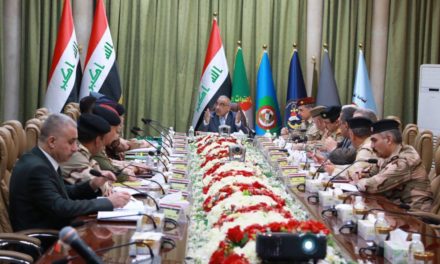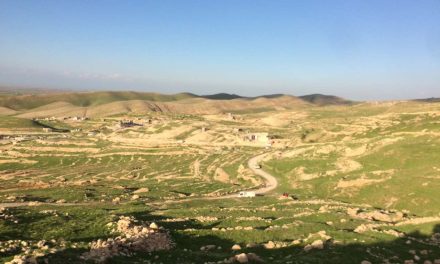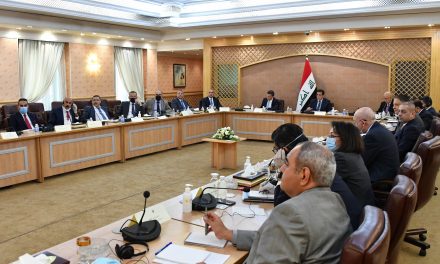(Photo: Al-Rasheed Media)
The vacant position of the speaker of parliament is approaching the one-year mark, with no resolution in sight. Despite two rounds of parliamentary voting and numerous mediation efforts to broker a compromise, a deal remains elusive. This week, Iraq’s leading Shia parties within the Coordination Framework once again called for parliament to convene to resolve the prolonged deadlock, but an agreement to hold a session tomorrow fell through. The events of the past year raise critical questions: why has the issue remained so intractable, and what does this prolonged struggle reveal about the complexities of Sunni politics in Iraq?
The turmoil over the speakership began on November 14, 2023, when the Federal Supreme Court (FSC) ruled to strip former Speaker Mohammed Al-Halbusi of his parliamentary membership due to accusations of forgery and dishonorable conduct. This ruling followed a lawsuit filed by Laith Al-Dulaimi, a former MP from Halbusi’s Taqaddum Party, who accused Halbusi of manipulating resignation letters signed by party members to tighten his grip on the party. The FSC concluded that Halbusi had indeed forged an official document related to Dulaimi’s resignation, leading to his removal from office.
The FSC’s decision triggered a prolonged battle to replace Halbusi as speaker, a position he had held since 2018. His ousting ignited fierce competition among Sunni political factions, all eager to claim the prestigious post.
Although the FSC’s verdict was unprecedented, Halbusi’s dethroning was not unexpected. It marked the culmination of an 18-month internal Sunni struggle over the speakership, during which his Sunni rivals had unsuccessfully tried to build a parliamentary majority to unseat him. The Coordination Framework remained neutral, backing the majority position of Sunni MPs in parliament. According to outspoken Sunni politician Mishan Al-Juburi, these efforts were ultimately thwarted by Turkey and the UAE, key backers of the alliance that had originally secured Halbusi the speakership.
Caught off-guard by his ousting, Halbusi held a press conference following the FSC’s ruling to argue that the Supreme Court’s decision was invalid. He cited Article 52 of the constitution, claiming it granted parliament—not the court—the authority to revoke an MP’s membership. However, it was unclear how he intended to reverse the decision, and his attempts to rally political support largely failed.
In response, Halbusi’s party issued a statement declaring that its three ministers would resign from the government, and that Taqaddum Party MPs presiding over parliamentary committees would step down. They also announced an indefinite boycott of future sessions. Resignation letters for the ministers of Planning, Industry, and Culture were released to the media, but none of these actions materialized. Halbusi’s MPs and ministers retained their posts, and the threatened boycott failed to exert enough pressure to reverse the FSC’s verdict. Ultimately, Halbusi accepted his fate and shifted his focus to ensuring his successor would be a candidate of his choosing.
First Attempt to Elect a New Speaker
In late November 2023, Iraq’s Sunni political factions began negotiations to elect a new speaker. But it quickly became evident that no consensus could be reached among the Sunni parties. Major coalitions—namely Azm, Siyada, and Taqaddum—each put forward their own candidates for the position, but no clear frontrunner emerged. The primary contenders included Shalan Al-Krayim from Salahuddin, who led Taqaddum’s parliamentary bloc; Mahmoud Al-Mashhadani from Baghdad, supported by the Azm Alliance; and Salim Al-Eisawi from Anbar, backed by Khamis Al-Khanjar’s Siyada.
On January 13, 2024, parliament held a vote to elect a new speaker, but the effort failed to produce an outright winner. Shalan Al-Krayim received the most votes, securing 152 out of 314, but fell short of the 165 votes needed for an absolute majority. Salim Al-Eisawi garnered 97 votes, while Mashhadani received only 48. The results surprised many, as Krayim’s vote count suggested that a significant contingent from the Coordination Framework had supported Halbusi’s candidate. How Halbusi managed to secure 152 votes for Krayim remains a matter of debate, given that his party holds fewer than 50 seats in parliament. The most common explanation points to alleged bribes influencing individual MPs and party leaders.
The outcome of the vote in parliament also revealed deep divisions within both Sunni and Shia camps, highlighting the lack of a clear path forward. The absence of internal agreement within the Coordination Framework over which candidate to support underscored the ongoing jockeying for power and influence within parliament.
Eisawi vs. Mashhadani
Following the failed January vote, Salim Al-Eisawi and Mahmoud Al-Mashhadani emerged as the leading contenders for the speakership. In an attempt to block Krayim’s candidacy, a group of Shia MPs filed a lawsuit seeking an injunction to suspend his nomination. This came after an old video resurfaced in which Krayim praised Saddam Hussein and the Baath Party, making it politically untenable for Shia factions to continue supporting him. Krayim eventually withdrew from the race in April after a falling out with Halbusi.
Efforts to hold another parliamentary vote were repeatedly postponed due to a lack of consensus among Sunni blocs and conflicting interests among Shia political factions. On March 2, all the leading Sunni blocs and parties, except Halbusi’s Taqaddum, gathered at Abu Mazin Al-Jubouri’s residence to unify their position. Led by Khamis Al-Khanjar, they issued a joint statement declaring themselves the “Sunni parliamentary majority.” This coalition included Azm Alliance, Abu Mazin’s Jamahir, Sunni MPs from Al-Aqd Al-Watani, and non-aligned Sunni parliamentarians, urging all blocs to participate in the upcoming session. In response, Taqaddum issued a sharp rebuttal, dismissing their rivals’ claim to a Sunni majority and asserting their own majority in parliament.
During this period, the central debate among Sunni groups centered on which camp truly represented the majority and, therefore, who was entitled to the speakership. Taqaddum’s Anwar Al-Alwani summed up his party’s position: “There is a political and constitutional entitlement and a political custom upon which the three presidencies in Iraq were formed, including the parliament’s presidency (speaker), which belongs to the Taqaddum Party due to its Sunni parliamentary majority.” This debate was crucial since the Coordination Framework had publicly committed to supporting the candidate that reflected the Sunni majority in parliament.
Halbusi Pushes For New Candidates
Concurrently in the spring, Halbusi’s party submitted a request to the Council of Representatives to amend Article 12 of parliament’s internal bylaws, which would allow new nominees to enter the race. Nearly 100 MPs, including many Shia members aligned with the Coordination Framework, signed the request. Meanwhile, Halbusi’s rivals within Siyada, Azm, and Hasm nominated Salim Al-Eisawi as their joint candidate and formally sought the Coordination Framework’s support for his bid. However, the Framework’s hesitancy reflected their recognition of Halbusi’s political weight and regional backing. With national elections around the corner, some factions within the Framework viewed severing ties with Halbusi as counter to their political interests.
The stalemate led key figures within Azm, dissatisfied with supporting Eisawi, to form their own faction. Four prominent Sunni MPs—Mashhadani, Khalid Al-Obeidi, Mohammed Nouri Abd-Raba, and Talal Al-Zubaie—along with politician Sheikh Faris Al-Faris, announced the formation of a new political bloc called Sadara. They aligned themselves more closely with Halbusi, aiming to position Mashhadani as a compromise candidate.
By May, as pressure to hold a new vote intensified, Mashhadani’s chances improved after Halbusi’s Taqaddum officially endorsed his candidacy. At first glance, Halbusi’s endorsement seemed like a shift from his previous insistence on nominating a candidate from his own party. In reality, it was an effort to exacerbate the stalemate in order to leave no option but to allow new candidates to enter the race.
As expected, the vote on May 18 failed to produce a new speaker. Eisawi garnered 158 votes, just seven shy of the required majority, while Mashhadani secured 137 votes. Tensions escalated within the chamber, leading to an altercation and the suspension of the session.
In June, another political realignment occurred. Eight MPs from Halbusi’s Taqaddum, led by Ziyad Al-Janabi, defected to form a new parliamentary bloc named Mubadara. Janabi, the influential chairman of the parliamentary Integrity Committee, held a press conference to announce the new group. The defecting MPs cited their frustration with the months-long stalemate in electing a new speaker, which had crippled the legislature. They explained that this deadlock prompted them to form Mubadara to break the impasse.
Janabi and his colleagues went on to engage in discussions with Qais Al-Khazali and Ammar Al-Hakim. Later, Halbusi seemed to endorse Janabi as a potential compromise candidate, leading to suggestions that Mubadara was a tactical move to secure broader support from both Sunni and Shia factions. The goal was to amend the bylaws, allowing Janabi and others to be considered for the speakership. But the Coordination Framework remained unwilling to greenlight this move.
Halbusi Shifts Tactics Again
By August, signs emerged that Sunni factions were edging closer to an agreement on the speakership. Mishan Al-Juburi hinted at a possible realignment among the Sunni blocs, with Mashhadani reportedly willing to withdraw his candidacy in favor of a compromise candidate. This development indicated a potential breakthrough in resolving the deadlock, although several obstacles remained.
According to Nouri Al-Maliki, despite early progress toward a deal, negotiations unexpectedly collapsed. The core of the proposal involved Halbusi’s Taqaddum Party surrendering one of its three ministerial posts in return for reclaiming the speaker’s position. However, internal disputes among Taqaddum’s rivals over which party would assume the vacated ministry derailed the agreement.
Although Halbusi had adjusted his tactics, his strategic goal remained unchanged—to push for an amendment to the bylaws allowing the nomination of new candidates. Halbusi claimed to have secured the backing of 55 Sunni MPs for this motion, yet the Coordination Framework continued to remain steadfast in its refusal to support this course of action.
On October 22, Halbusi’s Sunni rivals made a surprising shift. The Azm and Siyada blocs, which had previously supported Salim Al-Eisawi, abruptly endorsed Mahmoud Al-Mashhadani as their candidate for speaker. This decision came after reports emerged that the Coordination Framework had also agreed to back Mashhadani during their meeting earlier in the week, urging parliament to convene by October 26 to finally break the deadlock. However, despite these efforts, parliament once again failed to schedule the session, leaving the impasse unresolved.
Unpacking the Political Impasse
The events surrounding the year-long deadlock in appointing a new speaker provide several key insights into the characteristics and dynamics of Sunni politics in Iraq:
- Balancing Power is Key
A primary concern for the ruling elite as a collective is preserving the delicate balance of power among Iraq’s leading political forces. When one faction becomes too dominant, others often work together to contain its ascendancy. This principle explains why drastic measures were taken to unseat Halbusi and why, when Mashhadani nominated himself and received backing from Nouri Al-Maliki, other Shia factions within the Coordination Framework opposed him out of fear that Mashhadani’s victory would be perceived as a win for Maliki, whose power they sought to curb. - Fragmentation of Sunni Political Leadership
The highly fractious and fluid nature of Sunni politics in Iraq explains why Taqaddum, Siyada, and Azm failed to find a compromise candidate after a year of negotiations. Political alignments are highly personalized, and politicians are often easily swayed to shift allegiances for personal gain, as evidenced by the emergence of Sadara and Mubadara. Even alliances that are brokered by regional actors are susceptible, as exemplified by Siyada’s realignment from an alliance with Taqaddum to one with Azm. - Geographic Rivalry Within Sunni Politics
A significant divide exists between Sunni leaders from different provinces, particularly between Anbar and other Sunni-majority provinces like Salahuddin and Ninewa. Sunni MPs outside Anbar have pushed for the speakership to be held by someone not from Anbar, aiming to break the province’s dominance over Sunni political power. The geographic rivalry complicates the formation of cohesive leadership, with Halbusi resisting any Anbar candidate that threatens his hold over the province. - Influence of External Actors
External actors such as Turkey and the UAE play a substantial role in shaping the Sunni political landscape. These regional powers were instrumental in securing Halbusi’s previous speakership. The exact role of regional backers remains ambiguous, as evidenced by Erdogan’s April visit to Baghdad, where he hosted rival Sunni leaders at the Turkish embassy. Third-party mediators like Masoud Barzani have also attempted to resolve the standoff, with little success. - Interdependence with Shia Political Blocs
Sunni factions are heavily reliant on alliances with larger Shia coalitions, particularly the Coordination Framework, which holds significant sway over the outcome of the speakership race. Sunni factions must carefully navigate these alliances, balancing their agendas with the demands of Shia counterparts. Internal rivalries within the Coordination Framework have also contributed to the deadlock, with Shia factions failing to agree on backing a single candidate. - Political Turmoil Without Escalating Violence
Halbusi’s ousting was unprecedented; however, fears of political violence failed to materialize. Despite his initial threats to withdraw his party from the political process and resign his three ministers, these actions were never carried out. The choice to remain involved in politics underscores a lesson learned from the Sadrist retreat. Political survival requires access to the organs of the state in order to maintain leverage over rivals.

Ali Al-Mawlawi
Ali Al-Mawlawi specialises in Iraq’s political economy and governance reform.










